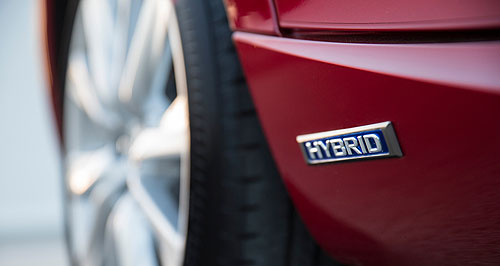News - LexusHybrid remains hero for LexusOn the rise: The IS300h petrol-electric hybrid makes up nine out of 10 sales of the small luxury sedan in Western Europe so far this year. Hydrogen fuel cell on the cards, but focus at Lexus remains firmly on hybrids12 Nov 2013 LEXUS will follow parent company Toyota’s lead and introduce hydrogen fuel cell-powered vehicles, but believes hybrid power will remain its core technology. The Japanese marque could also develop pure electric vehicle powertrains down the track as it expands its current repertoire beyond internal-combustion petrol and petrol-electric hybrid options. The next advancement in powertrain technology for the Toyota-owned luxury brand will be in the form of its first-ever turbocharged petrol engine, with Lexus revealing a 2.0-litre blown unit will sit under the chunky bonnet of the LF-NX SUV concept on show at next week’s Tokyo motor show. Speaking at the local launch of the mid-size ES sedan last week, Lexus global executive vice-president Mark Templin said take-up of its hybrid models was increasing globally, with interest growing in markets where hybrids did not typically sell in high numbers. “Next year we will have 10 different hybrid options in our line-up,” he said. “We don’t see that stopping, we see that taking us on. “In places like Western Europe we are going to become nearly 100 per cent hybrid. The new IS hybrid is 93 per cent of recent sales in Western Europe.” Mr Templin said while take-up of Lexus ‘hybrid drive’ models in the US market has not matched the split of that in Western Europe, awareness of the technology was growing with the release of each new model to its line-up – as evident in sales splits for its ES range. “In the US, the ES350 is the core model but even the hybrid model ES300h is at 35 per cent. In markets like Japan, hybrid is the Holy Grail. They don’t buy it for CO2 or fuel efficiency, they buy it because it’s the most advanced technology.” Mr Templin said hydrogen fuel cell technology was just one of a number of powertrain options for the luxury brand, but rollout of hydrogen production models was a little further down the track. “You can get zero emissions from an electric car but not from producing the electricity. Unless we get really good at wind or solar or nuclear, you are still polluting to create the electricity you put in the car to do it in the first place. “We see a long-term future, a way to produce hydrogen and be able to emit water as the end result. If you have driven hydrogen cars lately, fuel cells are unbelievable. “They are fun, they are fast, they are like big electric cars. Lots of torque, you go fast and no pollution.” Despite the government in Mr Templin’s home state of California developing infrastructure for hydrogen vehicles by building around 50 refueling stations, other US states and global markets have not been as quick to react. Mr Templin said he believed oil companies were best placed to lead the way with the wider roll-out of fueling stations as they already had the “easiest path to get to that hydrogen infrastructure”. Last week, parent company Toyota released images of its FCV (Fuel Cell Vehicle) concept that it will show at Tokyo. The concept produces 100kW of power and has a 500-kilometre driving range, with a refuelling time similar to that of a conventional car. Reports have suggested a production version could go on sale in 2015. Despite the current focus on hybrid technology and long-term plans for hydrogen powerplants, Mr Templin did not rule out offering a pure EV in the future. “Our corporate thought process is we have to be ready for anything. We are going to have internal combustion engines, forced-induction engines, turbocharged, small displacement engines, hybrids, plug-in hybrids, electric cars and we are going to have fuel cells, we need to be able to cover all of those. “But in big numbers, hybrid is where it is at,” he said. A number of Lexus’ European rivals have released variants of popular models with hybrid powertrains in recent years, including BMW’s ActiveHybrid 3, 5 and 7, while Mercedes-Benz has launched a diesel-electric hybrid variant of its mid-size E-Class. Mr Templin said Lexus took pride in being the first luxury marque to adopt hybrid technology as part of its mainstream powertrain strategy. “We actually feel really good that a lot of our competitors are rolling out their hybrids, they are launching their hybrids like crazy,” he said. “To us, we kind of wear that as a feather in our cap, saying ‘we did the right thing back in 2005 when we launched our first hybrid’.” Lexus has ruled out developing diesel or even diesel-hybrid powertrains for its vehicles, with Mr Templin suggesting it would not be viable for the Japanese car-maker. “We are not going down that path. Most of the wealthy people in the world live in big cities, and the best cars for low CO2 and good fuel efficiency are hybrids. “Diesels are great if you are going to drive across the countryside and go long, long distances but they are not core products for city-type vehicles and most people live in cities. Eighty per cent of the people in the world that are going to buy a luxury car are living in cities.”  Read more11th of November 2013  Lexus expects boost from turbochargers“Huge opportunity” for turbocharged powertrain in Lexus’ future – global VP6th of November 2013  Driven: Lexus ES returns, this time with hybridMid-size Lexus ES range returns to Australian market after seven-year absence |
Click to shareLexus articlesMotor industry news |
















Facebook Twitter Instagram